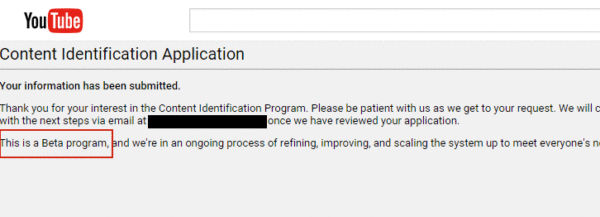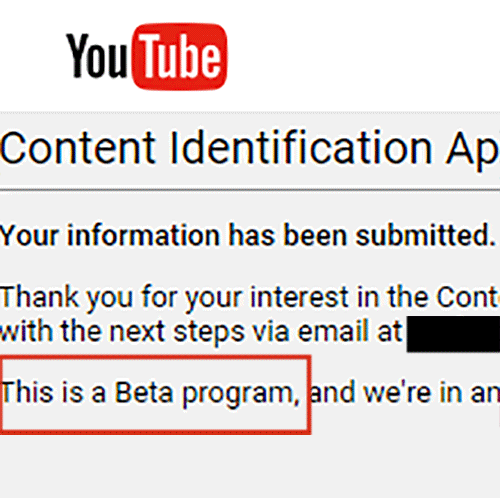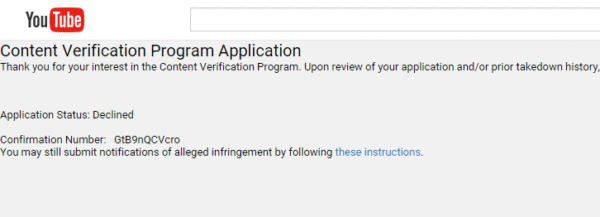NUMBER OF DAYS content identification tools for YouTube HAS BEEN IN BETA
[getdays]
BETA [bey-tuh or, esp. British, bee-] adj.
A pre-release of software that is given out to a large group of users to try under real conditions.
– PC Magazine Encyclopedia
We all are amazed at this tech giant Google and their many other companies such as YouTube. Their ability to meet the technological challenges of our times is phenomenal. Back in June 14, 2007, they announce an exciting new program called content identification tools for YouTube. I am certain the marketing department had many long meetings trying to figure out a catchy name for this new tool.
The state of our video ID tools
(From googleblog.blogspot.com – June 14, 2007)
“We’ve been developing improved content identification for months, and we’re confident that in the not-too-distant future, we’ll unveil an innovative solution that will work for users and content creators alike. This is one of the most technologically complicated tasks that we have ever undertaken. But YouTube has always been committed to developing sustainable and scalable tools that work for all content owners.
Even though we haven’t given too many details, we’ve been hard at work.”
Hard at work? Really? Then why is this program still in BETA?


From my submission 11/28/2015
And then when you try to see what is going on with your Content ID submission you get a denied. Just because you took down videos to protect your copyrights should logically have no bearing as to the fact that you own the copyrights to that material.

Ted calls Google, which owns YouTube, “a company that has done more to impoverish musicians and other creative professionals than any entity on the face of the planet.”
Ted Gioia from
http://www.artsjournal.com/culturecrash/2014/10/stop-working-for-free.html
So Google, just so you can keep your important projects up-to-date and rolling out in time, I will keep a YouTube Content ID in BETA widget on the right column of this website. Keep up the hard work Google! Maybe some day by the next millennium in the year 2107 Google’s YouTube Content ID project will get out of BETA and have a Release candidate of this product. Trust me. I am NOT holding my breath!
“Imagine a business model where you are given all of the music publishing content for the last hundred years for free. After you build the initial interface, you basically do not have to do anything. The system is set up so that users and fans just give you content even though they have no rights to the ownership of that content. With much of this illegal content you garner about 50% of all advertisement revenue generated by that content. This can go on indefinitely. Sounds like there is no way you can fail. You will make billions off this stuff. YouTube just laughs all the all the way to the bank.”
Anonymous
FURTHER READING ON THE SERIOUSLY FLAWED Digital Millennium Copyright Act
Passed on October 12, 1998, by a unanimous vote in the United States Senate and signed into law by President Bill Clinton on October 28, 1998, the DMCA amended Title 17 of the United States Code to extend the reach of copyright, while limiting the liability of the providers of online services for copyright infringement by their users.
- https://en.wikipedia.org/wiki/Digital_Millennium_Copyright_Act#Anti-circumvention_exemptions
- https://en.wikipedia.org/wiki/Viacom_International_Inc._v._YouTube,_Inc.
- http://www.copyright.gov/reports/studies/dmca/dmca_executive.html
Here is a really funny transcript of a Senior Copyright Lawyer’s speech to congress in April 2014 Why the Digital Millennium Copyright Act Is Working Just Fine… by Katherine Oyama ,Google Senior Copyright Counsel.
Check out the absurdity with this comment
Congresswoman Judy Chu, a job creation advocate from California, provided real time proof that Google was failing in burying pirated sites in their search results. Barely typing in a few keystrokes associated with the Oscar Winning Film, 12 Years a Slave, numerous pirate sites appeared immediately on her iPad near the top of Google’s first search page. Unfazed, the representative from Google continued to extoll the progress that was being made by her company in pushing these pirate sites down in their rankings.

